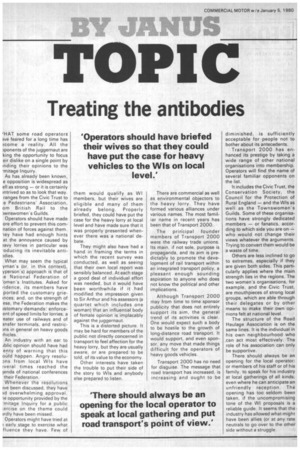T O PI
Page 46

If you've noticed an error in this article please click here to report it so we can fix it.
Treating the antibodies
'Operators should have briefed their wives so that they could have put the case for heavy vehicles to the Wls on local level.'
f HAT some road operators lye feared for a long time has come a reality. All the )ponents of the juggernaut are king the opportunity to focus eir dislike on a single point by nding their opinions to the -mitage Inquiry.
As has already been known, e opposition is widespread as ell as strong — or it is certainly rntrived so as to look that way. ranges from the Civic Trust to e Pedestrians' Association, om British Rail to the )wnswomen's Guilds.
Operators should have made ore effort to prevent this cornnation of forces against them. ley have had enough hints at the annoyance caused by ;avy lorries in particular was :oducing its inevitable anti)dies.
What may seem the typical yman's (or, in this context), yperson's) approach is that of ie National Federation of 'omen's Institutes. Asked for ridence, its members have ported the customary grieinces; and, on the strength of ese, the Federation makes the istomary demands: enforceent of speed limits for lorries, a :eater use of railways and of 3nsfer terminals, and restricms in general on heavy goods ihicles.
An industry with an ear to Jblic opinion should have had enty of warning that this ould happen. Angry resolu3ns from local Wls have :veral times reached the jenda of national conferences their Federation.
Whenever the resolutions ive been discussed, they have )d overwhelming approval.
)e opportunity provided by the -mitage Inquiry for a public :ercise on the theme could irdly have been missed.
Operators might have tried at early stage to exercise what fluence they have. Few of them would qualify as W1 members, but their wives are eligible and many of them already belong. Properly briefed, they could have put the case for the heavy lorry at local level and have made sure that it was properly presented whenever there was a national debate.
They might also have had a hand in framing the terms in which the .recent survey was conducted, as well as seeing that their own local report was sensibly balanced. At each stage a good deal of individual effort was needed, but it would have been worthwhile if it had modified the impression given to Sir Arthur and his assessors (a quartet which includes one woman) that an influential body of female opinion is 'implacably against the juggernaut.
This is a distorted picture. It may be hard for members of the public not directly concerned in transport to feel affection for the heavy lorry, but they are usually aware, or are prepared to be told, of its value to the economy.
Other interests have taken the trouble to put their side of the story to Wls and anybody else prepared to listen. There are commercial as well as environmental objectors to the heavy lorry. They have formed various alliances under various names. The most familiar name in recent years has been that of Transport 2000.
The priheipal founder members of Transport 2000 were the railway trade unions. Its main, if not sole, purpose is propaganda, and its aim is predictably to promote the development of rail transport within an integrated transport policy, a pleasant enough sounding aspiration to anyone who does not know the political and other implications.
Although Transport 2000 may from time to time sponsor publicity that does not entirely support its aim, the general trend of its activities is clear. One would expect such a body to be hostile to the growth of long-distance road transport. It would support, and even sponsor, any move that made things difficult for the operators of heavy goods vehicles.
Transport 2000 has no need for disguise. The message that road transport has increased, is increasing and ought to be diminished, is sufficiently acceptable for people not to bother about its antecedents.
Transport 2000 has enhanced its prestige by taking a wide range of other national organisations into membership. Operators will find the name of several familiar opponents on the list.
It includes the Civic Trust, the Conservation Society, the Council for the Protection of Rural England — and the Wls as well as the Townswomen's Guilds. Some of these organisations have strongly dedicated members — or fanatics, according to which side you are on — who would not change their views whatever the arguments. Trying to convert them would be a waste of time.
Others are less inclined to go to extremes, especially if they are given both sides. This particularly applies where the main strength lies in the regions. The two women's organisations. for example, and the Civic Trust, are mouthpieces of strong local groups, which are able through their delegates or by other means to make their own opinions felt at national level.
The structure of the Road Haulage Association is on the same lines. It is the individual in his own neighbourhood who ,can act most effectively. The role of his association can only be supportive.
There should always be an opening for the local operator, or members of his staff or of his family, to speak for his industry at local gatherings of all kinds, even where he can anticipate an unfriendly reception. The opening has too seldom been taken, if the uncompromising tone of the WI proposals is a reliable guide. It seems that the. industry has allowed what might have been allies. (or at any rate neutrals to go over to the other side without a struggle.
















































































